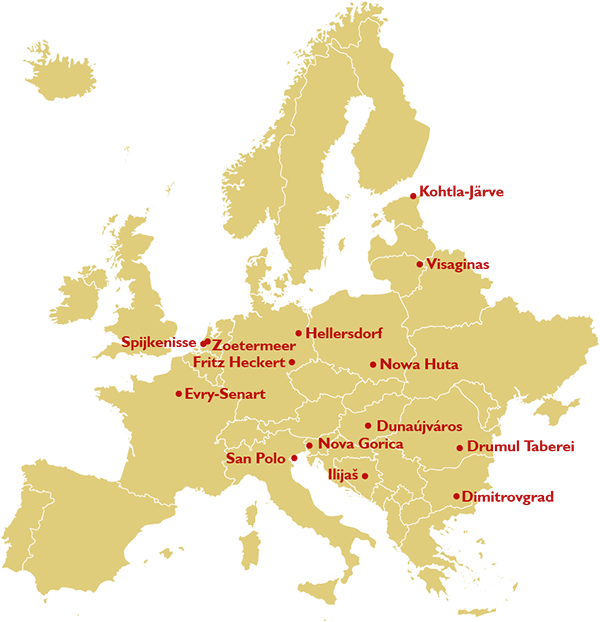
While the historic cities in Europe are seen as the places of culture and history, the New Towns are often seen as cultural wastelands. However, though New Towns are young cities, by now they have a history of 50-70 years which defines their identity. This is being appreciated by more and more New Towns, which study their history as a means to create their own narrative. This is not only a narrative which deals with the original planning and architecture (top down) but also a history of their inhabitants (bottom up). Oral history collects the stories of the original and new population, including the stories of immigrants and minorities. The main challenge is the enforcing of the exclusion discourse, between early dwellers and newcomers, between insiders and outsiders, between owners and renters, intellectuals and working class. The narrative of the city needs to be a participatory narrative in which all residents are able to recognize themselves.
As most New Towns are now in the phase of reinventing themselves and want to transform in more equitable and fair places, a proper understanding of the history of the city functions as a stable basis on which to build towards the transformations of the future. In the transition towards a more positive identity, the history of (all groups in) the city needs to take a central role. What is necessary to understand the history of the New Towns, whose history is it and what methods can be used?
Programme
20 Maart 2024
Afternoon:
Arrival participants during the day in Rotterdam, the Netherlands
13:00 – 15:00 Walk through Rotterdam Centrum (optional)
16:00 Meet at INTI HQ. Introduction of the theme of the Lab
Evening:
18:00 Diner at INTI HQ
After diner, walk to James Hotel, Aert van Nesstraat Rotterdam
21 Maart 2024
Morning:
8:45 Collect participants from James Hotel in Rotterdam, by bus
9:00 Bus-tour to Spijkenisse
11:00 Walking-tour through neighbourhoods Waterland/De Akkers
12:30 Lunch at community centre De Akkers
Afternoon:
13:30 Interactive workshop at community centre De Akkers with presentations
by Kohtla Jarve and Dimitrovgrad
17:30 Departure for Spijkenisse City Centre
Evening:
18:00 Visit library De Boekenberg
19:00 Diner at restaurant in Spijkenisse
21:00 With metro to James Hotel in Rotterdam
22 Maart 2024
Morning:
9:00 Gather at James Hotel, together in metro to Spijkenisse
10:00 Workshop at the City hall with input by all partners, experts
Afternoon:
12:30 Lunch at the City Hall, evaluation of the Lab
14.00 End of the Lab around 14.00 hrs
With metro to Rotterdam or other directions
Participants
Simone Rots, Michelle Provoost, Caterina Tioli, Misko Papac, Govert Buijs, Magriet Panman, Marcus Heinke, Jochen Becker, Constanze Musterer, Yoana Mitvichina, Yasho Minkov, Alex Axinte, Ioana Tudora, Marius Toma, Mihai Balint, Costin Muraru, Gabriella Zsinka, Csaba Gyöngyössy, Kinga Kotras, Béatrix Goeneutte, Wilfried Pingault, Irfan Salihagić, Elša Turkušić, Anton Makarjev, Henri Kaselo, Blaž Kosovel, Miha Kosovel, Jarosław Klas, Monika Kozioł, Oksana Denisenko, Giulia Piacenti, Oksana Beliakova, Oksana Denisenko, Shane Downer

Evry and Senart are two New Towns in the municipality of Grand Paris Sud that are both in transition to improve their equity and sustainability. They have very different characteristics and issues: Evry is more urban with a dense urban centre; its challenge is linked to the renovation of the urban core and its attractivity. Sénart is a ‘city in nature’ with a need to develop a strategy to better consider its green assets. Both towns have ‘priority’ neighbourhoods with large migrant populations, in which Grand Paris Sud is focusing on the reduction of inequality by social programs and urban renewal. Grand Paris Sud is working on different strategies to make its municipalities more sustainable. It is developing Eco-neighborhoods, heating networks, a bicycle plan and active public transport links, strategies for the reuse of brownfield sites and the reuse of soil and materials, and it is creating the CAAP, Centre for Art Architecture Landscape Heritage (https://caapp.fr/), which will offer a place of experimentation to architecture schools and become an exhibition space.
Next to that, it is developing strategies to make the green transition as just and inclusive as possible especially for the most vulnerable groups such as (migrant) women, for instance by offering language programs and bicycling courses. The city aims to raise awareness among residents (positive energy families, composters, etc.) and to modify the inhabitants’ habits so that they become greener. Also, the city is using tactical urban planning as a way of experimentation which is inexpensive, extensible and reversible, as a tool for iterative planning.
Programme
29 May 2024
Morning:
Arrival participants during the morning in Grand Paris Sud
12:30 Official welcome at the agglomeration headquarters followed by a lunch
Presentation on Grand Paris Sud
Afternoon:
14:00 - 16:00 Visit to the urban centre of Évry-Courcouronnes
Visit of the energy-efficiency renovation of housing project in the neighbourhood “Pyramides”
16:00 - 18:00 Introduction to the lab by INTI and presentation of 2 co-referent New Towns
Evening:
19:00 Dinner
30 May 2024
Morning:
8:15 Departure
Cycling tour on the 3 themes: sustainable food, energy, and green urban planning
9:00 Visit eco-district “Les Docks” in Ris-Orangis – example of green urban planning
11:15 Visit urban farm “Saint Lazare” in Grigny
12:45 Lunch at CFP (“centre de formation professionelle” = training and professionalisation centre)
Afternoon:
14:00 Visit neighbourhood “Grande Borne”
16:00 Train back to Évry-Courcouronnes
Evening:
19:00 Dinner
31 May 2024
Morning:
9:00 Collaborative workshop with inputs from participants about 3 topics :
energy, sustainable food and green urban planning
12:00 Lunch
Afternoon:
End of the lab and departures



